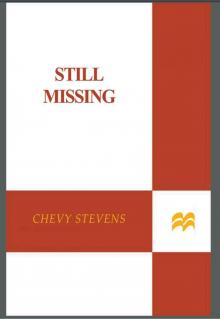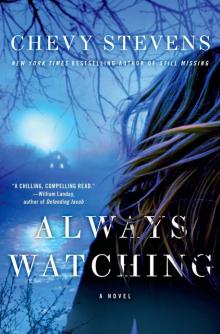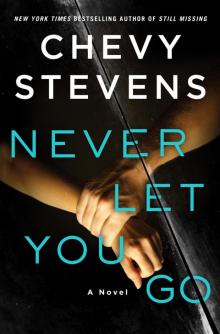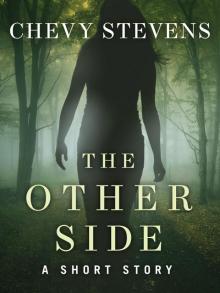- Home
- Chevy Stevens
Always Watching Page 4
Always Watching Read online
Page 4
* * *
That morning, as I walked down the hallway, I was disappointed that I’d missed Maurice, another psychiatrist who worked in the unit. I’d wanted to talk about Heather with him, but he’d finished his rounds early. Still thinking about what to do, and considering other doctors, I almost bumped into Dr. Kevin Nasser as he stepped out of his office—as the staff psychologist, he had an office on the main ward.
Kevin reached out to steady me, his hand warm on my arm, then said, “Good morning, Nadine. How are you?”
Many people just give the standard greetings without any real meaning behind the words, but from the first moment I’d met Kevin, I got the feeling that when we exchanged pleasantries, he was genuinely interested in my answer.
“I’m well, thanks. Is Erick in today?”
“He’s off for the rest of the week.” My face must have revealed something because he said, “Can I help?”
“I just wanted to get a second opinion on something.” I looked down the hallway, toward the ward. I was going to have to make a decision about this soon.
“Step into my office.” He opened the door.
I hesitated, wondering if I should work this out myself, then, still unsure of how to handle the situation with Heather, walked through. I hadn’t been in his office before and it appeared that he’d tried to fix it up a little: a fern in the corner, a wall tapestry, which looked like it might be from the Middle East.
When Kevin caught the direction of my gaze, he said, “Patients should have something to look at other than my ugly mug.”
He was far from ugly. True, he wasn’t classically handsome, like Daniel Simeon, but he had an interesting face. His features were almost Lebanese-looking, his nose broad, his skin tanned, with deep-set dark eyes, the corners turning down with fine lines radiating out. I knew he was forty-five, but his hair was still inky black, not a trace of gray. He didn’t dress very formal and tended to wear dark denim jeans with a nice shirt and tie, and then a casual blazer. He also wore clear-rimmed glasses with black metal earpieces that suited him. I’d only spoken to him a few times but thought him friendly and intelligent.
He said, “So how are you finding working at the hospital?”
“I’m enjoying it. Everyone’s been very welcoming.”
“Well, if I can ever help in any way, you let me know.”
I smiled. “Thanks.”
He said, “So what did you need a second opinion on?”
“A patient, Heather Simeon, was admitted a couple of nights ago after an attempted suicide, and during our initial interview she revealed something that made me realize I might not be the best doctor for her. I’d like to refer her to someone else.” Though we need to keep the patients’ information confidential outside of the ward, the doctors can discuss them because we work as a team.
“Can you tell me what she revealed?”
“We have a mutual acquaintance.…” Why was I dancing around this? I was a professional, he was professional. There was no reason to be embarrassed.
“And you think this might make it difficult to be impartial?” His tone was kind and matter-of-fact. I could see why he was so popular with the patients.
“Yes, but it’s more complicated than that.” I took a breath. “She and her husband were recently living at a commune in Jordan River.”
He wrinkled his forehead. “You mean The River of Life Center?”
“You know them?”
“I attended a yoga retreat there years ago.”
“What did you think?”
“They were a little intense and called a few times after, wanting me to attend other retreats, but besides that, they were okay. They seem to be heavily influenced by Eastern philosophy, mysticism, Hinduism, and Buddhism, and they’re also dabbling in some Gestalt Therapy, but I didn’t get the feeling they were married to any one belief.” He added, “They’ve done some good things for the community, recycling and conservation programs, planting a public garden.”
I thought over everything he said, which matched with what I’d learned from Heather and my own online research.
“So how does the center fit into your dilemma?” he asked.
“My patient and her husband lived there for a while as full-time members, and since they’ve left, it seems like some members have been harassing them.”
He looked concerned. “What kind of harassment?”
“From what I can tell, it’s mostly phone calls, similar to what you received, but they appear to be of a more pressuring nature. The center wants them to come back.”
“Do you know why they left?”
“She was pregnant.” I explained what Heather had shared about the center’s beliefs and that she felt members were blaming her for the miscarriage.
“How’s she doing now? Has she been showing any signs of paranoia?”
“She’s understandably depressed. She also has some symptoms of complex post-traumatic stress syndrome, and she’s very dependent on her husband.” My mind drifted back to the commune, the way my mother didn’t want to go into town alone after we returned home, how she made my father go everywhere with her.
Kevin said, “Is that what you wanted an opinion on?”
“No, it’s about the center. I knew the leader. When I was growing up…” How much did I want to reveal? This wasn’t something I talked about, even with my closest friends. “My mother joined the commune with my brother and me when we were children. We lived with them for eight months.”
His eyes were sympathetic. “I take it you don’t have happy memories.”
The thing is, there were some good moments, swimming in the river, running around barefoot with the other kids, animals everywhere, but it was all clouded in darkness and a feeling of dread when I thought back to the commune.
“It was a difficult time in our lives and something I’d put behind me.”
Kevin said, “And that’s why you don’t want to work with this patient?”
“I’m just concerned I’m not the right doctor for her.”
He gnawed on his lower lip. “All the psychiatrists at the hospital are good, so any of them would be fine, and I understand why you might want to walk away, especially if you think there’s any risk of countertransference.”
I nodded. “Of course, that’s one of my main concerns.”
Kevin said, “But as long as you think you can maintain objectiveness and appropriate self-disclosure…” Another thing psychiatrists had to be careful of was not to share their own feelings. We can tell them we’ve had experiences with pain or abuse, to show we empathize, but we can’t share specifics. “I don’t see any ethical issues involved with you continuing to treat her, do you?”
I thought over what he said while studying the books on his shelf, noticing that he had a few on meditation. He specialized in Dialectical Behavior Therapy, which blended standard cognitive behavioral techniques with acceptance and mindfulness, mostly derived from Buddhist meditative practice. Judging by other titles, he was also interested in philosophy. But I was avoiding his question.
“No, I suppose not.…” I’d been worried that my having memories of an upsetting time in my life might make it hard to be objective, but he was right—there was no ethical reason I couldn’t keep working with Heather.
“Maybe I should stay with her and play it by ear.”
Kevin nodded in agreement. “If you need to talk about it again, just let me know.”
“Thanks. I’ll see how she does over the next couple of days.”
In the cafeteria, refilling my tea, I thought over the conversation. I’d left in an odd mood, uncomfortable somehow, but I wasn’t sure of the source. Was it because I’d shared something personal with a coworker? Someone I barely knew? I reminded myself that I hadn’t said much, and there was no reason to worry, but I still had the feeling that I’d just opened another door, one that it was too late to close.
CHAPTER FIVE
Looking back to those first months at
the commune, before Aaron began to lead the group, I realize he wasn’t that old, only twenty-two, but to my teenage mind he was much older. He was so sure of himself, so confident about his decisions and opinions. No matter what the problem was, a fire that almost got out of control, low food supplies, rats in the grain, a sick animal, he never seemed worried. He would just think for a bit and come up with a solution, and it always worked. I’d never met someone who smiled so much, who always seemed happy and excited. For a child with a mother whose moods blew all over with the wind, and a father who was perpetually angry, it was confusing to meet someone who woke up each day like the world was full of wonderful things waiting to be discovered.
It was shortly after my mom, Robbie, and I arrived that Aaron revealed a little about his background. We were sitting around the campfire one night, and he’d been playing his guitar, as he often did. It was amazing how he could pull a tune out of thin air, just from someone humming the first few bars of a song. Some of the little children were climbing all over him, as usual—they all loved him for the toys he carved out of wood and the piggyback rides he gave. One of them had fallen asleep leaning against Aaron, who stopped playing to pull the little boy into his lap. Another member asked Aaron if he ever wanted a family, and a distant look came to his eyes as he stroked the child’s hair.
“You guys and Joseph are my family.” Aaron, who was from San Francisco, had joined the commune with his brother a couple of weeks before us. “We don’t have anyone else.” He glanced at Joseph, who was sitting quietly in a shadow by the fire, watching his brother. Aaron gave him a smile.
A female member said, “You have no one?”
He shook his head. “Nope, and good riddance. Our parents were just teenagers. After they had Joseph, my dad took off, leaving us with our mother. She was an alcoholic.”
Aaron handed the little boy back to his mother, then lifted up his jeans leg, showing us small round scars up and down his shins. “These are from cigarettes.”
Some of us gasped, or made sympathetic noises, and Joy, whom we’d met the first day, reached out to touch his shoulder. “That’s terrible.”
“It wasn’t as bad as this.” He lifted the back of his shirt, revealing long red scars, the flesh raised and jagged-looking. “That’s from when she dragged me naked over broken glass because I’d tried to feed Joseph, after she forgot.” His face was angry as he dropped his shirt back down. “She only cared about herself.”
I had never heard someone talking so openly about their feelings and didn’t know what to think. I had never told anyone about my own family’s struggles. I noticed my brother also studying Aaron, admiration in his face.
Aaron said, “She eventually split. We had to live with our grandfather, until he finally died.” He stared into the fire, poked at a piece of wood, his mouth a grimace. “He was a real bastard.”
He fell silent, gazing into the fire. Joy, her voice soft, said, “Where did you go after he died?”
He roused himself, blinking at her like he just remembered that he was still with people. “We lived on the streets, then we met some people and were taken into an ashram. I studied under a guru for a few years.”
One of the male members leaned forward. “You got to study with a guru? Is that how you learned to meditate?”
We’d all seen him meditating every day, and some were already joining him.
Aaron looked excited now. “It was amazing, everything he taught me, how to live a spiritual life—you guys have no idea what you can do with your own power, it’s untapped,” he said. “I used to suffer from back pain every day. I couldn’t even bend over, but my guru taught me that I was creating my own pain by holding all my fear and anger inside. He showed me how to release it with meditation, and now…” He stood up and stretched, touched his toes.
* * *
After that night it seemed the members grew more willing to follow Aaron’s advice. None of us had much experience living off the land. Some of the other members were straight from the city, with vague romantic notions of roughing it and getting back to basics. It had been a tough winter, and many of them were losing heart. But Aaron wasn’t just playing at the hippie lifestyle, he was living it. He must’ve seemed incredibly worldly to most of the kids who’d grown up in Canada and had never even been out of BC. He’d also gained a lot of skills—agriculture, carpentry, how to run a farm—and he was generous and patient about sharing that knowledge. Aaron showed the commune how to build a sweat lodge so we could cleanse our chakras, which when blocked or damaged could affect our physical and emotional health. He also held kirtana meditation ceremonies in the lodge, where we’d all chant as a group, sometimes using musical instruments and clapping our hands, but he mostly taught transcendental meditation.
The young men were always trying to impress Aaron with some feat of strength or bravery, working from dusk to dawn by his side, never complaining, even if they hurt themselves. The girls also followed him around, giggling if he glanced their way, and I’d hear them talking about how good-looking he was, how cool and fun. But it was more than that.
Aaron remembered details about each member, where they were from, what their family life had been like. He suggested that one shy young man take charge of the horses, and the man grew more confident every day, teaching others how to ride and look after the tack. Another member, a woman who always spoke in a whisper, was encouraged by Aaron to take over responsibility for all our meals when he realized how good a cook she was. She too blossomed, ordering the kitchen helpers about, loudly scolding us kids for stealing a snack.
He’d also trained in vibrational healing, the ability to move his own energy through others. When a member complained of back pain, a headache, or various other ailments, Aaron offered to take them for a private meditation in his tent. He’d use his hands to clear their meridians, and the pain disappeared. One man who struggled with arthritis was soon limber again, and a woman who’d had problems conceiving was quickly pregnant. Coyote and Heidi, who were Levi’s parents, had also been told they couldn’t have another child, but Aaron said he could help them, and she too became pregnant.
It was after Heidi got pregnant that Aaron told us the way to achieve enlightenment was through a strict discipline of daily rituals and that we needed a leader for it to work. Everyone voted for Aaron. He said, “I’ll only agree if you promise to think of me as the head of our family, not your boss.” He put us on the same schedule that he’d lived with at the ashram. First thing in the morning we’d practice meditation. Next we’d feed the animals and have breakfast—all meals were eaten in silence, so that we could savor our thoughts. The commune was also strictly vegetarian, but the table was always overflowing with food: whole wheat bread, honey, brown rice, beans, blackstrap molasses, bran, fruit and nuts, goat cheese, vegetables fresh from our garden. We’d meditate again, usually in the meadow, where we were open to the earth’s magnetic field. Then we’d do more chores.
After lunch, when we’d have a period for reflection, he’d send us out on long walks, so we could tune into nature’s healing vibrations, or we’d chant in the lodge, and maybe take a swim in the summer. Then we’d work some more, building cabins, or out in the fields and gardens, followed by a silent supper, another session of meditation, and sometimes another swim or walk.
Not long after Aaron assumed leadership, those evening campfires changed. Instead of sitting around singing every night, we now sat in Satsang, a Sanskrit word meaning “gathering together for the truth.” We’d talk about things we’d experienced that day in our practice, some members crying, or laughing, even angry. Aaron would explain how they could deepen their self-recognition and release any destructive emotions, awakening to their life’s purpose. I was amazed to hear my mother admit that she’d finally let go of anger toward her father, who’d left her mother for another woman when she was a teenager.
We also spent a lot of time learning about the benefits of sustained living and making plans for the future, s
o that the commune could be completely self-sufficient. Aaron said, “We’re only stewards of the land, and we have a responsibility to treasure it.” He said that every environmental disaster was the earth groaning in pain—and he hated logging companies with a passion.
We were all willing to accept Aaron as our leader, but his brother Joseph was another story. He was quiet, but not in a peaceful way, more like he was about to explode over the smallest thing. He looked a lot like Aaron, but on him everything was slightly distorted. His lips more turned down, his skin paler, and his face, thin, angular. His hair was also thin, and he wore it braided and tied back with a leather strap.
The two brothers were close, though, and I never could tell if Aaron was even aware of how nervous his brother made everyone else. Aaron said his brother was an empath, who knew when someone was faltering. We’d be in quiet meditation when Joseph would suddenly stand up and scream at someone. Once he slapped Heidi in the shoulder, and we all sat there stunned. Coyote looked like he wanted to fight, his fists tense, but Aaron whispered something to him, then calmly took his brother off to his cabin to clear his chakras.
Aaron told us that Joseph could also feel who needed the most healing or who was struggling with a spiritual lesson. They were at risk for becoming sick, so Aaron would go off with them privately, while we continued with our chores or meditation practice. They were usually female members who needed his private counsel, which he explained was because we were more intuitive and therefore more susceptible.
Sometimes Joseph stayed in his tent for days, refusing food, and meditating for hours. Aaron would praise Joseph for his commitment, so then other members started doing the same thing. After some sweat-lodge ceremonies, Joseph would start ranting, “There’s evil spirits in the woods—I could hear them singing.” Sometimes he would also hear music.
Aaron said, “Joseph is more sensitive to negative energy waves than most people, so he can hear things on another level.”

 Still Missing
Still Missing Always Watching
Always Watching Those Girls
Those Girls Never Knowing
Never Knowing Never Let You Go
Never Let You Go That Night
That Night The Other Side
The Other Side Dark Roads
Dark Roads